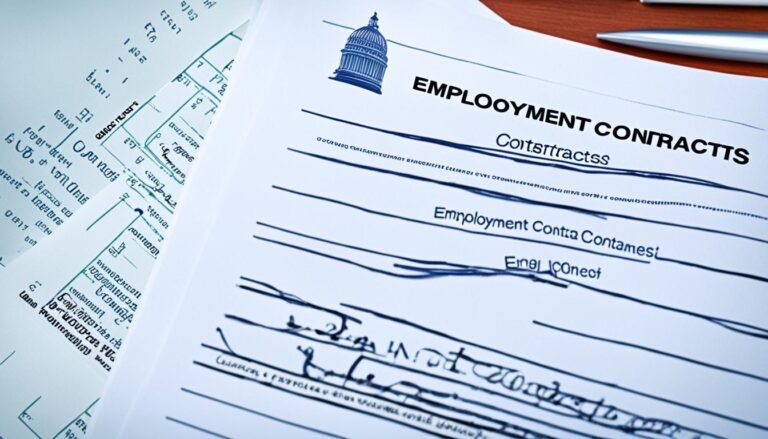Fraud Prevention Tips for SMEs
Did you know that small and mid-sized businesses are often the targets of fraud? The Association of Certified Fraud Examiners (ACFE) found that SMEs suffer most from fraud. This includes financial losses and harm to their name. Protecting your business from fraud is crucial for its health and growth.
In this article, we’ll cover key fraud prevention tips. These are specially made for SMEs. They will help you keep your business safe and reduce the chance of falling for fraud.
Key Takeaways:
- Implementing fraud prevention measures is crucial for small and mid-sized businesses.
- Theft, financial statement fraud, and asset misuse are the common types of fraud to be aware of.
- Establishing controls, conducting regular audits, and educating employees are vital in preventing fraud.
- Creating a code of ethics and promoting a fraud prevention culture helps deter fraudulent activities.
- Vigilance and ongoing efforts are necessary to safeguard SMEs from fraud and maintain their financial integrity.
The Types of Fraud to be Aware Of
Keeping your small business safe from fraud is key. You must know about the different kinds of fraud. This knowledge arms you to fight back and protect your business. The main types of fraud small and medium enterprises (SMEs) should watch out for are:
- Theft: A common type of fraud is theft. This happens when someone takes a business’s money, items, or other assets without permission. For instance, employees might take money from the cash register, inflate expenses, or misuse company items.
- Financial Statement Fraud: This fraud is about lying in financial statements. Fraudsters might upplay revenue, lessen costs, or pad assets. They do this to trick investors and lenders about the true financial state of the business.
- Asset Misuse: Asset misuse occurs when people use a company’s property wrongly without permission. Examples include taking company cars for personal errands, or using corporate credit cards for personal shopping.
SMEs must work to stop these fraud types. They can do this by putting strong controls in place, doing regular checks, and building a culture of honesty. These steps lower the risk of becoming a fraud target.
Reducing Vulnerabilities in Finances and Bookkeeping
Protecting your small business from fraud is vital. Many small to medium enterprises mistakenly put all their financial trust in one person. This setup raises the chances of fraud slipping by. A good way to lower this danger is by using the separation of duties method.
Separation of duties means having two people in charge of the money, each with their specific jobs. This stops one person from having full control, which makes it harder for fraud to happen.
Using accounting software that checks for data errors offers another shield against fraud. This software keeps an eye on your financial transactions, looking for anything fishy. It can spot and stop fraud in its tracks before it harms your business.
Bringing in a virtual Chief Financial Officer (CFO) can also be a smart move. A virtual CFO is an expert who can look out for frauds, check your business’s financial wellbeing, and offer smart money advice. The good part is you get the help without the usual cost of a full-time CFO.
Combining these steps can make your business much safer. With careful attention to who handles your money, using smart software, and the advice of a virtual CFO, you can prevent fraud and keep your business secure.
Hiring Practices to Prevent Fraud
It’s crucial for SMEs to follow a solid hiring process. This helps stop fraud. By checking applicants thoroughly, businesses can avoid those likely to commit fraud.
Reference Checks
Checking references is a key part of hiring. It lets companies learn about the person’s work style and honesty. This step confirms if the candidate’s info is true and if they might cause a fraud risk.
Verifying Previous Employers
It’s important to confirm where applicants worked before. SMEs should talk to past employers to check job details. Doing this helps avoid hiring based on false claims of skills or experience.
Checking Criminal Records
Looking into an applicant’s criminal background may be needed, especially for money-handling jobs. The importance of this varies by job and where you are. Such checks add extra safety to the hiring process.
Thorough Background Checks
All job applicants should undergo background checks. These checks look at honesty, financial health, and risk. SMEs must review credit, work history, and any job-related licenses.
Emphasizing Financial Integrity
Not even long-time employees are fully fraud-proof. Pressure can lead anyone to make bad choices. Encouraging honesty and ethical values can help prevent fraud.
“Fraud prevention starts with the hiring process. By implementing thorough reference checks, verifying previous employers, and conducting criminal record checks for relevant positions, SMEs can reduce the risk of potential fraudsters slipping through the cracks.”
Imposing Controls and Monitoring Activity
SMEs need to use fraud prevention controls to keep their money safe and avoid damage to their image. These steps make a company reliable and secure. They should take these key steps:
1. Restricting Employee Access
To stop inside jobs, limiting who can see financial details is key. Only let trusted people view or change money info. Use things like secret passwords and only let certain staff do certain money jobs.
2. Multi-Person Sign-Off
When it comes to spending money or approving costs, two heads are better than one. Make sure more than one person okay’s all big money moves. This way, it’s harder for someone to sneak bad deals under the radar.
3. Audit Logs and Trails
Keeping a record of who does what with the money helps a lot. Use special software to track every financial decision from start to finish. This makes it easier to spot if there’s something shady going on.
4. Online Banking and Monitoring
Using the safety features of online banking can also protect a business. Always keep an eye on company accounts for any fishy money moves. Online banks can also send you instant alerts if something doesn’t look right. Then, follow up quick to stop a loss.
| Fraud Prevention Controls | Description |
|---|---|
| Restricting Employee Access | Limit access to financial data to authorized individuals only. |
| Multi-Person Sign-Off | Require multiple individuals to review and approve financial transactions. |
| Audit Logs and Trails | Implement comprehensive audit trails to track and monitor financial activities. |
| Online Banking and Monitoring | Regularly monitor account activity through online banking platforms. |
These fraud prevention controls can really lower fraud risks for SMEs. Always check how well they work. This keeps them doing the job right.
Conducting Regular Audits
SMEs need to check their operations often. This checks if everything is done right. It helps find fraud, keeps money safe, and makes others trust them.
Watching cash closely is very important. Looking at the money going in and out helps find any shady actions. This can be things like wrong handling of money or weird financial moves.
Inventory checks are also a must. SMEs compare what they think they have to what’s actually there. This guards against theft or poor tracking. Using systems to track and checking randomly can find more fraud.
Looking at the money records is a big deal in audits. SMEs carefully check their financial papers. They make sure all money coming and going is right. This catches fake papers, hidden money moves, or mistakes in the money reports.
A Clear process for audits is key, using surprise visits is better than patterns. This makes catching fraud harder for those trying. It keeps people honest more than if they know when they’ll be checked.
SMEs can use tech to help with audits too. Special programs can point out bad money moves. Normal checks on the data can show if something fishy is happening with the money.
Sample Audit Checklist
A clear audit checklist is great for keeping checks thorough. Here’s a sample to start with:
| Area | Audit Tasks |
|---|---|
| Cash Management | Review cash transaction records, reconcile bank statements, validate cash handling policies and procedures. |
| Inventory Management | Compare physical inventory with recorded levels, check inventory tracking systems, conduct random spot checks. |
| Accounting and Bookkeeping | Review financial records, validate expense claims, assess the accuracy of financial statements, check for compliance with accounting standards and procedures. |
| Data Analytics | Utilize software tools to analyze financial data for anomalies or patterns. |
| Internal Controls | Review and assess the effectiveness of internal controls, identify any weaknesses or vulnerabilities. |
Doing audits often helps find and stop fraud. It also keeps everything clear and honest. By checking the money, items, and records well, SMEs can keep risks low. They make sure their place is safe and trusted.
Employee Education and Reporting
SMEs need to focus on teaching employees about fraud to better prevent it. Teaching staff helps them spot and stop fraud in the company. This makes employees key in catching potential fraud.
To make sure employees feel safe, set up a way for them to report fraud without sharing their name. This way, staff can tell if they see something wrong without worries. Anonymity means their identity stays secret, so they’re not afraid of what might happen if they speak up.
“Educating employees about fraud prevention and setting up an anonymous reporting system lays the groundwork for stopping fraud within SMEs.”
“Teaching employees and allowing them to report anonymously are great for fighting fraud in SMEs.” – David Johnson, Fraud Prevention Expert
Getting everyone involved in spotting fraud helps SMEs build a place of trust and honesty. When staff actively work to stop fraud, it lowers the risk. And it shows how important it is to act with integrity at work.
Benefits of Employee Education and Reporting
Teaching employees about fraud and letting them report it anonymously has many good points for SMEs:
- Finding fraud quickly helps prevent harm
- Makes the workplace more open and honest
- Cuts down on fraud happening and its bad effects
- Meets high standards for ethics and laws
- Gives a bigger group a role in finding fraud
- Builds a great work culture that values honesty and responsibility
By getting staff to help against fraud, SMEs protect their business and keep a good image.
Establishing a Code of Ethics
SMEs should make a clear code of ethics. This shows they are serious about honesty and ethical behavior. It helps prevent fraud and stops unethical acts in the company.
This code should cover how to do business right and how employees should act. It needs to say fraud is not allowed. It makes it clear that the company stands against fraud and wrong actions.
It could talk about being honest and fair in business. And always doing what’s right. Or how everyone involved should be treated fairly and with respect, like employees and customers. It also mentions keeping private info safe and encouraging people to report fraud safely.
Letting everyone know these rules, SMEs build a culture against fraud. They make sure their team values honesty and does ethically sound work. Training on these rules and expectations is key to make sure everyone understands and follows them.
Having a strict code of ethics stops fraud and earns trust. It shows the company wants to do things the right way. This is good for employees, customers, and all others involved. It makes the message clear that the company is fair and honest.
Example: Code of Ethics
| Principle | Description |
|---|---|
| Honesty and Integrity | Act with honesty and integrity in all business transactions, maintaining the highest ethical standards. |
| Confidentiality | Respect and protect confidential information, ensuring it is not used for personal gain. |
| Conflict of Interest | Avoid conflicts of interest and disclose any potential conflicts promptly. |
| Fraud Prevention | Recognize the signs of fraudulent activities and promptly report any suspicious behavior. Comply with all fraud prevention measures and actively contribute to establishing a fraud prevention culture within the organization. |
| Compliance with Laws and Regulations | Observe and comply with all applicable laws, regulations, and industry standards. |
| Fair Treatment | Treat all stakeholders, including employees, customers, suppliers, and competitors, fairly and with respect. |
| Accountability | Take responsibility for one’s actions and be accountable for maintaining ethical conduct. |
Conclusion
Small and medium-sized enterprises (SMEs) must prioritize fraud prevention. This is necessary to avoid financial losses and keep their good name. By using the fraud prevention advice given here, SMEs can lower their fraud risk. They’ll make their business safer and more reliable.
Ongoing care is crucial in fighting fraud. SMEs need to keep their fraud safety tools up to date. They should also teach their staff how to find and stop fraud.
Setting up checks and balances is another good step. This includes limiting who can see certain financial information. It also means requiring more than one person to agree on major financial moves. Regular checks through audits are important as well. SMEs should also have a way for workers to report bad activities without fear.
Using these fraud prevention methods will help SMEs keep their businesses safe. It builds trust and ensures their future success.
FAQ
Q: Why is fraud prevention important for SMEs?
A: Fraud prevention is key for SMEs. It protects them from losing money and their good name.
Q: What are the different types of fraud that SMEs need to be aware of?
A: SMEs should watch out for theft, false financial statements, and misuse of assets.
Q: How can SMEs reduce vulnerabilities in finances and bookkeeping?
A: To lower the risk, SMEs can use these tips. Have different people do different money tasks. Also, use special software and virtual CFOs.
Q: What hiring practices can SMEs follow to prevent fraud?
A: Before hiring, SMEs should check backgrounds. This means looking into references, past jobs, and criminal histories of those handling money.
Q: How can SMEs impose controls and monitor financial activities to prevent fraud?
A: SMEs can watch over their finances better by doing a few things. Limit access to money records. Use more than one person to okay money moves. Also, keep detailed records and check them often, using online banking.
Q: Why is conducting regular audits important for SMEs?
A: Regular checks help SMEs find fraud signs early. This is especially crucial in money management, refunds, and checking goods in and out. It also helps spot problems in bookkeeping.
Q: How can employee education and reporting help prevent fraud in SMEs?
A: Teaching about fraud and setting up a way to report it is vital. This empowers employees. They can stop, identify, and report shady practices more effectively.
Q: Why is establishing a code of ethics important for SMEs?
A: Making a clear no-tolerance policy on fraud helps a lot. It tells employees that fraud is wrong. And it builds a culture that fights fraud upfront.
Q: How can SMEs protect themselves from fraud?
A: SMEs safeguard against fraud by being alert, educating staff, and setting tight control and reporting rules.







